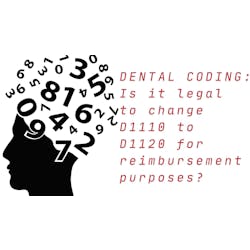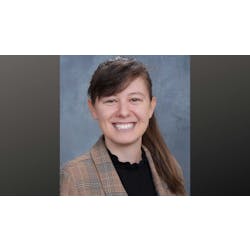To submit letters to the editor, send to: RDH, P.O. Box 3408, Tulsa, OK 74101; [email protected]; or (918) 831-9804 (fax).
Dear RDH:
I just read the December 2007 issue's Readers' Forum. I never reply to comments that other people have made, but this time I just couldn"t help it.
The writer said she had contemplated writing a letter to her state board of dentistry regarding the restorative functions of dental hygienists. I live and practice in Ohio, where the state dental board is comprised of a bunch of dentists who should have retired 20 years ago. Until recently, it has been a fight every inch of the way to get our dental board to agree to any changes. We have expanded function dental assistants here, but the dental board has nothing to do with boards or credentialing these people at all. (I happen to be one of the EFDAs in addition to being a dental hygienist). This year, they finally decided to register them. This means that they will probably just want some money from us to update the registration annually.
My point here is that the dental board in Ohio would keep the practicing hygienists doing just prophylaxis while everyone else would be licensed to do so much more. That certainly takes away the competitive edge of hygienists within this state. If you want to relocate to another state, everyone else out-credentials you.
You are incapable of competing with the market at hand.
The writer stated that she teaches in a dental hygiene program. As an educator, her job is to get these people prepared to compete in a fierce market. What is the point of over-educating us if we cannot utilize what we have learned? Thirty-five years ago, we were given instruction in anesthesia but never got to utilize the education because the state dental board just passed anesthesia for dental hygienists this past year. If you look at California, the hygienists have been giving anesthesia for years. You can't begin to convince me that hygienists in California are smarter than the ones trained in Ohio. But if we would relocate to California, we would have to take additional training in order to compete in the marketplace. And the California hygienists got the training in their dental hygiene curriculum.
She then went on to say that dental students are much more qualified at doing a filling than a hygienist. She has obviously never seen what the curriculum is for dental students. She stated that they get eight years of training. Actually, they get four years of undergrad which can be a major in anything — electrical engineering, biology, English — you name it.
That four-year degree does not help them with fillings. When they get to dental school, they don't see a patient until the end of their first year, and that is to clean their teeth. When I worked in a dental school's administration (there are only two in Ohio and I live in Cleveland), that translated into three prophies and one competency. The second year, they do 10 prophies and two competencies. So in the first two years, they see 16 patients. Hygienists see more than that during their two-year program. During the last two years, dental students learn about perio, oral surgery, pedo, ortho, endo, implant restoration, prosthodontics, and restorative dentistry. All of that in two years while being in the clinic at the same time.
The dental students do not have extensive training in the restoration of a prepped tooth as compared with an EFDA's curriculum. The EFDA's training consists of one full day a week for approximately 10 months before being able to sit for the board.
Dental school is not like dental hygiene school. Hygienists get a comprehensive education where they become competent in what duties they are to perform in the office upon graduation and sitting for the boards. Dentists get two years of clinical time doing a handful of prophies for two years with traditional classroom lectures. In the last two years of dental school, they put into practice all other aspects of dentistry that they have learned, which far exceed restorative. It includes every specialty.
One of our graduating seniors told me that when he opened his practice, he was going to hire one person to do both the front desk and assisting. My response was: You better get your wife to come in and work. He didn't even understand that most clinical people don"t like administration and vice versa. And where are you going to hire someone to do two jobs for the salary of one?
I have been a hygienist for 33 years this fall. I completed EFDA training in 2002. (Thankfully, I didn't have to come up with nearly $5,000 for that aspect of my education. I went through the program gratis because I worked for the university.) Last summer, I took the anesthesia course, which the schools now incorporate into their programs. That was another $1,000.
The hygiene schools are supposed to be getting the cream of the crop when it comes to recruiting students. None of this is rocket science. We need people who are both right and left brained so they can understand the scientific end of it and then translate it into the artistic end when doing the restoration. We do that now with our currettes. If we don't embrace change, we are going to end up being left behind. Knowledge is power!
The author stated that she didn"t have the time, desire, or energy to expand her functions to include restorative dentistry. The field is finally changing. In my humble opinion, an educator who does not wish to keep up with the times always has the choice to stop teaching. The students should not be made to suffer in their employment endeavors because the faculty does not want to keep up.
The job of the educator is to educate his or her students. If the student does not matriculate being competitive, the educator has truly done an injustice to the student. I taught application software for 15 years. Every time they changed a version, I had to change my teaching methodology. I never once considered saying: "I don"t feel like teaching you the latest version — let"s go back to DOS and skip Windows altogether." The educator is the pathfinder for the student, the one who awakens the creativity within the student, and the person excited about moving forward and setting a positive example.
Actually the statement was made: "I often feel that two years is not long enough to prepare students for working in dentistry."
Pardon me, but I am appalled at that. For all practical purposes, we are getting almost the same amount of clinic time that dental students get in four years. The prophylaxes that they perform in the first two years are not multiple appointment procedures. They see the patient once for a maximum three-hour appointment. The cleaning is complete at that point for the dental students. Dental hygiene students need dexterity to perform their duties. The inclusion of restorations would certainly help hone dexterity issues for the practitioner. The more they use their hands in every capacity possible, the more finesse they will develop and be able to utilize in the whole arena of dentistry.
If you do not want a board certified expanded function dental assistant or a licensed hygienist to complete your restoration, you, as the patient, have the option to take your business elsewhere. But since the demand is so high for these professionals, that indicates that the antiquated thinking about auxiliaries is not in the majority.
The author then moved onto the whole aspect of insurance and the business end of dentistry. Without trying to complicate the initial agenda, I will say just a few things. The last time you went to the supermarket, did you tell the cashier that you will pay them $10 a month? Of course not.
First and foremost, people go into this profession to make a living. If you don"t address the business concerns of this profession, you will have unemployed people who want to deliver health care to their patients. Dentists have an extremely high overhead in their businesses that they have to surpass in order to make a profit. Look at all of the equipment — your medical doctor does not have all of that. He sends you to the lab or the hospital. The dentist has this all self-contained in his office, so the patient doesn"t have to leave the office. He also has to have the personnel who can run all of the equipment. He has to have people to bill the patient, collect from the patient, and then a collection agency when all else fails. This is a whole independent topic of its own, so I will leave it at this.
The performance of dental restorations by the auxiliary is not an indication that the auxiliary wants to be a dentist. Prepping the tooth with an irreversible procedure is an indication of wanting to be a dentist. Being licensed to perform more in the office makes you much more valuable. When the dental hygiene schedule falls apart for the day — yet the dentist's schedule is packed — that would certainly make the dentist think twice about moving up all of your patients and sending you home with a half day's pay. It makes you much more valuable to the office and in the delivery of dental services. Once you have the education, if you decide that all you want to do is flick calculus off of patients' teeth all day long, you can get a job doing that. You don"t have to utilize what you have learned but at least you have it. You are a much more rounded individual within your office and a true professional in the practice of dental hygiene.
As my mother always told me growing up, people can take everything else away from you. They can repossess your house or car. They can steal from you. But an education is something that no one can ever take from you. From my point of reference, knowledge is power. I don't want someone to limit how far I can soar. I want them to clear the path and lead the way, and show me that I can be anything I want to be.
Judith Lee Maneely, EFDA, RDH, BS, MBA
Cleveland, Ohio





